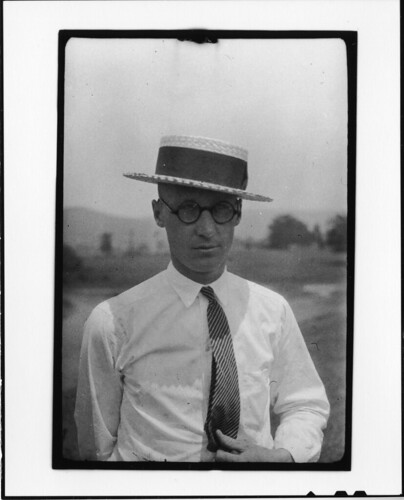In the
New York Times, November 16, 1919, prof. Charles Lane Poor, professor of Celestial Mechanics at Columbia University, explained Albert Einstein's
theory of general relativity:
When is space curved?
When do parallel lines meet?
When is a circle not a circle?
When are the three angles of a triangle not equal to two right angles?
Why, when Bolshevism enters the world of science, of course!
In the early days after Einstein's discoveries, people were very confused about the meaning of the word "relative" in that scientific context. It simply did not mean that "anything goes" or that "there are no rules" (just as
bolshevism was confused with
anarchy). Similarly, jazz was interpreted as "chaos in music", although jazz bands always were integrated in particular historical and cultural contexts, and therefore as relative (in the true meaning of the word) as the laws of physics.
"For some years past," Professor Poor said the other day, after reading the cable dispatches about the Einstein theory, "the entire world has been in a state of unrest, mental as well as physical. It may well be that the physical aspects of the unrest, the war, the strikes, the Bolshevist uprising, are in reality the visible objects of some underlying, deep mental disturbance, world-wide in character. This mental unrest is evidenced by the widespread intent it social problems, to throw aside the well-tested authors of Governments in favor of radical and untried experiments."
Professor Poor dismissed Einstein's theories as "psychological speculations and fantastic dreams". He compared them to some rivals of Newton, who had tried to find other explanations for the moon's motions than the forces of gravitation - "during a time of profoud mental and political unrest". Newton had prevailed, and he would prevail against these new "speculations" as well, was the Professor's conviction. Einstein's notion of a fourth dimension was the final blow: the professor felt as if he had been "wandering with Alice in Wonderland and had tea with the Mad Hatter".
Interestingly, the article nowhere mentions jazz, except in the caption. Perhaps it was added in order to excite the reader. If there was
any conceivable connection between jazz and bolshevism and physics, only a die-hard anti-semite could have spotted it.
It is important to remember that Einstein was not alone - many scientists had co-operated with him, contributed to his results and pointed out mistakes:
Max Planck, Henri Poincaré and Hermann Minkowski, among many others. As Einstein's genius became more and more recognised, the critical tone changed. I was amused to find another musical reference in
Martin Gardner's popular book about the theory of relativity from 1962,
Relativity for the Million. According to Gardner, the theory had the same effect on the world as the new dance fad, the
twist, which invaded the American dance halls in 1962! Some danced the twist with enthusiasm, some were deeply shocked and indignated (as our prof. above), and others complained that they were too old to learn it. (Perhaps people in the 1960's had forgotten all about how shocking jazz used to be?)
Further reading:
Albert Einstein, Relativity: The Special and General Theory. New York: Henry Holt, 1920 (online at Bartleby.com)


